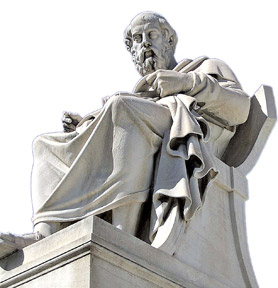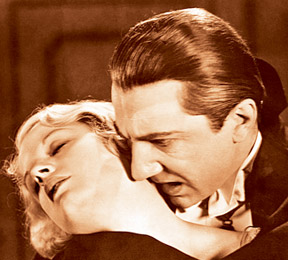|

Philosopher to the end
February 15, 399 BC ancient Greek philosopher Socrates was
sentenced to death for what was seen as political crimes against Athens.
In his staunch pursuit of ultimate truth, his criticism of democracy,
and his efforts to force Athenians to show more allegiance to truth and
justice, he was seen as an aggravator in a time when Athens was seeking
stability, in the years following the
 Peloponnesian
War. He is also considered the greatest and most influential Western
philosopher in history Peloponnesian
War. He is also considered the greatest and most influential Western
philosopher in history
On this fateful day philosopher Socrates stood before a jury of 500
of his fellow Athenians accused of “refusing to recognize the gods
recognized by the state” and of “corrupting the youth,” for which his
penalty would be death.
Socrates was 70 years old and familiar to most Athenians. His
anti-democratic views had turned many in the city against him. Two of
his students, Alcibiades and Critias, had twice briefly overthrown the
democratic government of the city, instituting a reign of terror in
which thousands of citizens were deprived of their property and either
banished from the city or executed.
After hearing the arguments of both Socrates and his accusers, the
jury was asked to vote on his guilt. Under Athenian law the jurors did
not deliberate the point. Instead, each juror registered his judgment by
placing a small disk into an urn marked either ‘guilty’ or ‘not guilty.’
Socrates was found guilty by a vote of 280 to 220.
The jurors were next asked to determine Socrates’ penalty. His
accusers argued for the death penalty. Socrates was given the
opportunity to suggest his own punishment and could probably have
avoided death by recommending exile.
Instead, the philosopher initially offered the sarcastic
recommendation that he be rewarded for his actions. When pressed for a
realistic punishment, he proposed that he be fined a modest sum of
money. Faced with the two choices, the jury selected death for Socrates.
The philosopher was taken to jail where his sentence was carried out.
Athenian law prescribed death by drinking a cup of poison hemlock.
Socrates would be his own executioner.
Plato was Socrates’ most famous student. Although he was not present
at his mentor’s death, he knew those who were there. Plato described the
scene through the narrative voice of the fictional character Phaedo.
“When Crito heard, he signalled to the slave who was standing by. The
boy went out, and returned after a few moments with the man who was to
administer the poison which he brought ready mixed in a cup. When
Socrates saw him, he said, ‘Now, good sir, you understand these things.
What must I do?’
‘Just drink it and walk around until your legs begin to feel heavy,
then lie down. It will soon act.’ With that he offered Socrates the cup.
The latter took it quite cheerfully without a tremor, with no change
of colour or expression. He just gave the man his stolid look, and
asked, ‘How say you, is it permissible to pledge this drink to anyone?
May I?’
The answer came, ‘We allow reasonable time in which to drink it.’
‘I understand’, he said, ‘we can and must pray to the gods that our
sojourn on earth will continue happy beyond the grave. This is my
prayer, and may it come to pass.’ With these words, he stoically drank
the potion, quite readily and cheerfully.
Up till this moment most of us were able with some decency to hold
back our tears, but when we saw him drinking the poison to the last
drop, we could restrain ourselves no longer. In spite of myself, the
tears came in floods, so that I covered my face and wept - not for him,
but at my own misfortune at losing such a man as my friend. Crito, even
before me, rose and went out when he could check his tears no longer.
Apollodorus was already steadily weeping, and by drying his eyes,
crying again and sobbing, he affected everyone present except for
Socrates himself.
He said, ‘You are strange fellows; what is wrong with you? I sent the
women away for this very purpose, to stop their creating such a scene. I
have heard that one should die in silence. So please be quiet and keep
control of yourselves.’ These words made us ashamed, and we stopped
crying.
Socrates walked around until he said that his legs were becoming
heavy, when he lay on his back, as the attendant instructed. This fellow
felt him, and then a moment later examined his feet and legs again.
Squeezing a foot hard, he asked him if he felt anything. Socrates
said that he did not. He did the same to his calves and, going higher,
showed us that he was becoming cold and stiff. Then he felt him a last
time and said that when the poison reached the heart he would be gone.
As the chill sensation got to his waist, Socrates uncovered his head
(he had put something over it) and said his last words: ‘Crito, we owe a
cock to Asclepius. Do pay it. Don’t forget.’
‘Of course’, said Crito. ‘Do you want to say anything else?’
‘There was no reply to this question, but after a while he gave a
slight stir, and the attendant uncovered him and examined his eyes. Then
Crito saw that he was dead, he closed his mouth and eyelids.
This was the end of our friend, the best, wisest and most upright man
of any that I have ever known”
- ‘The Suicide of Socrates, 399 BC,’ EyeWitness to History
Dracula 1931:
Vampire legacy
Dilmika TENNAKOON
Dracula was first published as a book by Bram Stoker in Great Britten
in 1897. The story was based on myths and legends about vampires that
existed from ancient times. The book was adapted into a film in February
15, 1931 by Tod Browning. Vampire Dracula captured the public interest
due to the chilling portrayal of the character in the horror film
version.
|

Lugosi’s unique thick Hungarian accent and lascivious eyes made the movie
a hit |
The character of Dracula has become very popular after the film. Many
people who were exposed to the famous vampire through film did not know
it was based on a novel. Bela Lugosi was the protagonist who portrayed
Dracula. He helped to keep the story alive and influenced the
imagination of the people.
Origin
Eastern-European old folkloric belief in vampires which emerged in
late 18th and early 19th Century was used to portray Dracula. According
to critics Dracula was based on a historical figure. Fifteenth Century
Romanian ruler ‘Vlad’ was known for his inhuman brutality. He had the
taste of impaling people alive on wooden spikes and watching them die in
slow agony.
Universal monster movies stepped in to a new era with the release of
Dracula in 1931. Starting from 1931 Dracula films have added more
mystery to the legend Dracula. Only after this film moved to America the
icon Dracula became popular among the audience of the world. It has also
become a global production though it is known as a popular American
cultural product.
Dracula is a complex model, coming from both Western European Gothic
tradition and East-European vampire folklore. It also had a profound
cultural influence.
Some critics say that the film Dracula was not overshadowed by
Stoker’s novel. According to them it was directly descended from a stage
production.
First film
However Tod Browning’s Dracula, was the first authorized motion
picture which was adapted by Bram Stoker’s novel. But there were other
motion pictures of Dracula which were created more successfully and
artistically than Browning’s film.
The first film based on the Dracula story was Nosferatu (1922). Ten
years before the release of Browning’s Dracula, F M Murnau, a German
film maker brought the story to the screen in the silent classic
Nosferatu. But it was sued for copyright infringement and the movie was
withdrawn.
However, up to now Nosferatu stands as the most artistic, strange and
frightening adaptation of Dracula.
Nosferatu vividly illustrated the gothic, scary, chilling atmosphere
which has illustrated in the novel. But Browning’s 1931 edition doesn’t
match the earlier movie.
Protagonist
However the protagonist Bela Lugosi played a magnificent role as
Dracula (1931). Up to now no one can imitate Lugosi because of his
unique thick Hungarian accent.
Today when people think of Dracula they think of Lugosi. Even though
many actors have played the role since, no one could challange Lugosi.
After Lugosi’s horror movie, more than 160 films have featured Dracula
in a major role.
Comparing with Nosferatu and Borwning’s films, the Spanish 1931
Dracula is superior in almost every way, except foe the missing image of
Bela Lugosi. Public got a proper idea of what a vampire is, due to
Lugosi’s lascivious eyes and elegant accent.
The modern mythology of vampirism which people strongly believe in
was highly influenced by these films.
However Dracula remains a most thrilling horror movie to this day,
even after 70 years of its first release. The myth of Dracula has become
a worldwide phenomenon. \\\\
|



